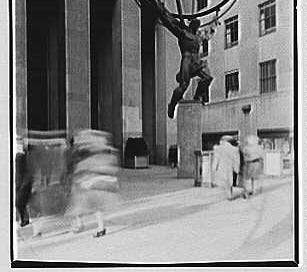The Rockefeller Building, home of BSC, in 1940 (Library of Congress).
British Security Coordination (BSC) was a British intelligence organisation operating in the United States during the Second World War. Founded in 1941 under William Stephenson, its work grew to encompass the American activities of MI5, SOE, and the Security Executive as well as the Secret Intelligence Service, MI6 (ref 1, pp.440-441).
History
1939 - a peacetime MI6 station
At the outbreak of the Second World War, the only MI6 station in the United States, was in New York, designated '48000' (ref 1, p.438). Operating under the traditional cover of Passport Control Officer, Captain Sir James Paget had only nine staff, having been ordered to cease operations against United States targets in June 1938 (ref 1, p.438).
1940 - Stephenson arrives
In April, MI6 sent the Canadian businessman William Stephenson on a mission which established liaison with the FBI (ref 1, p.439). Through a mutual acquaintance, the boxer Gene Tunney, he had an entrée to J. Edgar Hoover, who invited him to secure an official position to maintain the link (ref 1, pp.439-440).
As a result of this suggestion, Stephenson replaced Paget on 21 June (ref 1, p.440). His orders from the head of MI6, Stewart Menzies, were to 'investigate enemy activities, to institute adequate security measures against the threat of sabotage to British property and to organize American public opinion in favour of aid to Britain' (ref 1, p.440).
Stephenson was appointed as the Western Hemisphere representative of SOE in December, and of the Security Executive the following month (ref 2, p.xxx).
1941 - a sanctioned organisation
In January 1941, Stephenson's organisation was officially registered with the State Department as British Security Coordination, a name suggested by Hoover (ref 2, p.xxx).
The scale of BSC's activities nevertheless concerned some members of the administration, notably Assistant Secretary of State Adolf Berle (ref 1, p.488).
During a visit by the British Director of Naval Intelligence Admiral Godfrey, in the summer of 1941, BSC lobbied successfuly for Bill Donovan to be given a role co-ordinating US intelligence (ref 1, p.411).
After US entry into the war in December 1941, much of its work could be taken over by the FBI and other US agencies (ref 1, p.451).
1942 - full alliance
During 1942, Stephenson lobbied successfully for allied powers to be excluded from the foreign agent provisions of the McKellar Bill, (ref 1, p.451).
1943 - beginning of obscolescence
Following an inspection by Air Commodore Lionel Payne, MI6 pressed for steep cuts in BSC's strength at the start of 1943. Stephenson was able to ensure a more gradual reduction (ref 1, p.453).
1945
Shortly before the end of the War in Europe, Stephenson commissioned some of his subordinates to write a secret history of BSC and its achievements (ref 2, p.x).
Keep reading with a 7-day free trial
Subscribe to Tom Griffin on intelligence history to keep reading this post and get 7 days of free access to the full post archives.




